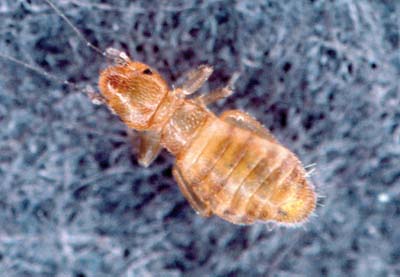
Psocid or booklouse (unidentified species).
(Photographer: J.L. Castner, University of Florida)
Psocids are small insects that are commonly found throughout the world in damp places. While many of the species in this order are found out-of-doors, a few species are found inside buildings and some are serious pests of stored products kept under humid conditions. They feed on organic matter (usually mold) and may be present in great numbers. They are only a problem because of their presence, not because of any damage.
Psocids are creamy white to tan in color and about 1 mm long. The front of the face (clypeus) is bulbous. The immatures resemble the adults in form and structure. The species found indoors are tiny, usually wingless, insects. Females each lay about 100 eggs. In one species, the cereal psocid, females reproduce parthenogentically (males are not known). The life cycle takes about three weeks to complete.
Images
To save the Web-optimized images shown below to your hard drive:
|
Click to access Display and Print quality images. |
|
Click to access Display and Print quality images. |
|
Click to access Display and Print quality images. |